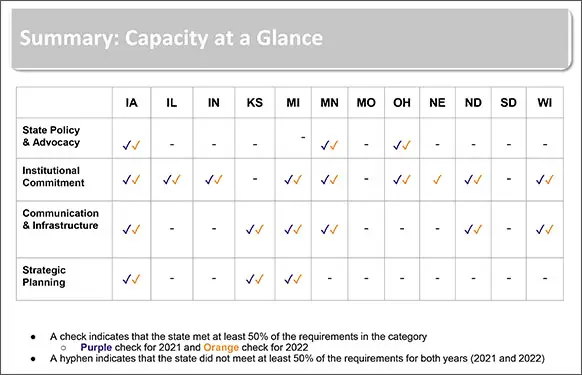Free Educational Resources Save Students Money, Create Efficiencies
With colleges and universities across the Midwest increasingly seeking ways to reduce costs and enhance quality education for students, the Midwestern Higher Education Compact is stepping up its work to expand access to freely available, openly licensed educational resources that serve as alternatives to conventional textbooks.
Fueled by a second grant of $432,400 from the William and Flora Hewlett Foundation announced this month, the Compact is helping institutions and states create policies, make connections, and build awareness around open educational resources (OER).
“We seek to build the capacity of colleges, universities and states to find, create, and effectively use free, high-quality teaching and learning resources,” said Jenny Parks, vice president of policy and research for the Compact. “We find states are in vastly different places on this. We are helping each member state develop plans and leadership.”
Over the past several years, MHEC staff have worked to bring order and understanding to a field that has grown from many ad hoc local efforts to a national movement. While some states have active statewide teams in place, other states are just getting started. The Compact has hosted and led initial convenings for several states and brought national expertise and resources to specific challenges identified by institutions and state leadership teams.
With growing interest and investment in OER from systems and states, MHEC published a report this year offering guidance on how to calculate the financial benefits of investments in OER. Toward Convergence was developed in partnership with the National Consortium for Open Educational Resources and state partners to provide a framework for communicating the return on their investment in open educational resources. Those returns are achieved through a combination of cost savings to students and families, student achievement, and reduced duplication.
Building on the momentum of recent projects, the Compact’s future work to sustain coordinated efficiencies around OER include:
- Supporting minority-serving institutions in implementing and scaling up use of high-quality, free resources to positively impact student success;
- Developing consistent practices for identifying and marking courses supported by OER so that student outcomes data is more consistent and reliable;
- Building the capacity of every state to build its own OER infrastructure that is independent of logistical and financial support from MHEC;
- Fostering a Midwestern community of practice that is engaged with high-quality national resources and leadership.
“Until the last 20 years, faculty had few options other than commercially-published textbooks and the high prices that accompanied them,” said Parks. “Colleges and universities are eager for guidance on this new frontier of open access. National and regional efforts are changing the landscape for the better and students will be the ultimate winners. MHEC is uniquely positioned to convene and connect colleges and universities.”

